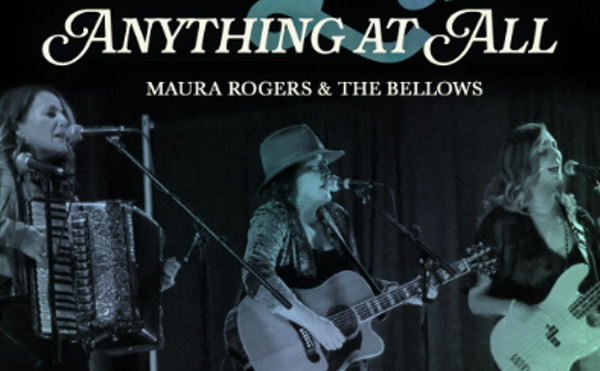Scars on Broadway
Scars on Broadway(Interscope)
With System of a Down on hiatus, drummer John Dolmayan and backup singer/guitarist Daron Malakian are biding their time in Scars on Broadway. The group's self-titled debut should please System fans that have little patience for the band's schizophrenic sideways leaps between new metal, old metal, erratic rock and traditional Turkish flourishes. The album sounds like System demos with less bouzouki, a different singer and no obvious radio singles.
Writing a Beatlesque melody is on every musician's must-do list, and Dolmayan checks it off with "Funny." Its calliope keyboards spill over into "Exploding/Reloading," a Molotov cocktail about Jesus, genocide, suicide and lies, with a few la-di-da diversions thrown in for good measure. The duo's '60s fixations continue in "Stoner Hate," a wind-sprint workout that's haunted by Charles Manson's ghost, in which Malakian sort-of rhymes "Supercalifragilisticexpialidocious" with "mama mia" - apparently, he has a hand in some of System singer Serj Tankian's stream-of-consciousness eruptions. "Universe" sends a nasal shout-out to Dylan and updates the crew's list of public enemies, adding Mickey Mouse next to the Masters of War. - D.X. Ferris
Original Broadway Cast Recording
Passing Strange(Ghostlight)
Back in the '90s, Mark Stewart fronted a Los Angeles band called the Negro Problem. These days, Stew is a Tony Award-winning singer-songwriter whose autobiographical musical, Passing Strange, recounts his life as both a young boho getting high in Europe and a black man playing rock 'n' roll in the U.S. The original cast recording of the hit play occasionally falls under Broadway's sway: oversung arias, hackneyed set pieces and cast members playing to the cheap seats. But it also rocks, especially when Stew is on the mic (his co-stars, coming from the theater world, mostly go through the motions) and leading the band through a mix of punk, rock, pop, gospel and R&B tunes. And Stew's story ("a black, middle-class dream," he calls it in the prologue) is a captivating one that barely skirts racial divides as the protagonist hops around Amsterdam and Berlin, fulfilling his very American dreams of sex, drugs and rock 'n' roll. - Michael Gallucci
Black Kids
Partie Traumatic(Columbia)
I'd imagine the Killers might be a bit displeased. Now they have a bunch of brats from Jacksonville, Florida, ripping off the sound they ripped off from '80s buzz-kill dance rockers like New Order and, to a degree, Duran Duran. Maybe it's the fact that Black Kids (or someone) hired Suede's Bernard Butler to produce, or maybe it's the fact that the band often relies on kiddie-style chants during choruses, but there's just something not right about Partie Traumatic.
Mostly, it tries to be a dance-rock album, but where a band like Franz Ferdinand succeeds in moving the masses with sharp guitar hooks and Scottish wit, Black Kids falls short of the mark, perhaps because it's too busy referencing things like text messaging. Tween culture shines on during "I've Underestimated My Charm (Again)," a song about a girl's rise to fame via a blog, and dancey electro-fueled claps greet you during "Listen to Your Body Tonight," a tune that urges you to, well, you know. Sure, they're hitting all the necessary points to ensure a lovely Gossip Girl fan base, and this is largely for whom the record was made. But really, when you open up by describing love pursuits as "hitting the heartbreak" and leading to an inevitable "crash," you're a bit doomed from the start. - Michael D. Ayers
Conor Oberst
Conor Oberst(Merge)
Bright Eyes "frontman" Conor Oberst is the kind of genius that comes along a couple of times a decade. Oberst is like Kurt Cobain; he's there to suffer for the sins of his generation - in this case, emo - and reconstitute known tropes while feeling, sensing and reaching harder than his contemporaries. He writes better songs and boasts better looks too.
Having driven out the demons of being depressed in his teens and disenfranchised in his 20s, he remains vital because he hasn't yet made his masterpiece and follows up three great-to-excellent efforts (Read Music/Speak Spanish by the one-off Desaparecidos group and I'm Wide Awake, It's Morning and Cassadaga by Bright Eyes) with a fourth.
The only thing different about Conor Oberst is its straightforwardness. It hides behind no moniker, as Oberst turns out 11 of his most normal tunes ever. That should ensure that Bruce Springsteen remembers to call him back next year. With lyrics like "There's nothing the road cannot heal" to "If I go to heaven I'll be bored as hell," Oberst has never sounded more like a cranky, crooning troubadour - he's finally shaken "indie" off his résumé. With tunes as lovely as the lilting "Cape Canaveral" or the fist-clenching "Souled Out!!!," he's becoming damn-near universal. - Dan Weiss
Plastilina Mosh
All U Need Is Mosh(Nacional)
On its latest release, this Mexican duo (Jonaz Gonzalez and Alejandro Rosso) continues to mix the diverse musical tendencies that brought it together just over a decade ago. Though the two were video-game aficionados at the time they first met, their personal music preferences couldn't be more different. While Gonzalez was a keen follower of Sepultura and Metallica, Rosso's background was classical music with a touch of John Coltrane and Antonio Carlos Jobim. They were somehow able to find common ground, and their latest release sounds like a compilation that mixes rap, funk, dance and rock into one package, with singing in both English and Spanish.
A good example is "Toll Free," which begins with a funky bass line, then morphs into a more dance-oriented tune. The mood shifts a bit with "Going to Mars Bolton" (one of the few instrumental tracks on the disc), which has zero guitar, relies mostly on Rosso's electronic expertise and is begging for a DJ remix. Another interesting track is "Pervert Pop Song," a '70s disco-inspired tune with lyrics that poke fun at those who enjoy rough sex. All U Need Is Mosh doesn't necessarily reproduce what the band does onstage, which is closer to metal than you hear here. It's nevertheless a good document of where the band is now, and it certainly deserves a place on fans' playlists. - Ernest Barteldes
Ida
My Fair, My Dark (Polyvinyl)
After taking a relatively lengthy break for such a busy band, New York City's Ida has seemingly returned to its more prolific nature. Since hooking up with Polyvinyl Records for 2005's return (and return to form), Heart Like a River, the band has seen the release of the solid if unspectacular Lovers Prayers earlier this year and now this odds-and-sods EP, which collects a few non-album tracks, a live number and some covers. This covers-mixed-with-originals bit has served Ida well in the past, as its excellent 1997 record Ten Small Paces is still one of its best-loved moments. The results are just as positive on My Fair, and the quality-over-quantity ratio is startlingly high.
The highlight is the cover of John and Beverley Martyn's "Road to Ruin," a song that vocalist Elizabeth Mitchell claims for her own after an impressively brief duration. Ida also visits Dolly Parton's catalog for a straightforward reading of "The Pain of Loving You." Country is an idiom Ida touched on as far back as Paces' cover of Bill Monroe's "Blue Moon of Kentucky" (played for laughs as "Blue Moon of Livonia"). Whereas the Monroe cover was slapdash and haphazard, the Parton song is played straight and beautifully, with the gorgeous harmonies suggesting that the band could have a nice second career as an interpreter of Nashville standards, if it wished. With this beginning-to-end solid EP as further evidence, it's clear Ida's break has served it well; it sounds refreshed, regrouped and ready to continue this late-career hot streak. - Chris Drabick
Black Light Burns
Cover Your Heart and the Anvil Pants Odyssey(I Am: Wolfpack)
Black Light Burns (featuring former Limp Bizkit guitarist Wes Borland) provides a number of diverse and interesting interpretations of classic songs on this release. Its cover of Duran Duran's "Hungry Like the Wolf" starts off with the pulsing of a synthesizer that eventually gets overwhelmed by machine-gun drumming. As the rhythm speeds up toward the end of the song, it's as if the drums are chasing after an organ keyboard melody that gets caught in a mirror maze. It brings this once-cheerful tune to its knees.
As if the cover of the Duran Duran classic weren't enough, Black Light Burns outdoes itself with Fiona Apple's "On the Bound," which borrows from Apple's dark library but makes itself, with muffled vocals, into something entirely different. Cover songs make up 10 of the 17 tracks on Cover Your Heart. The remaining seven tracks are instrumental, and the keeper is "Failing," which shows off the band's lighter side by displaying a clean and soothing guitar riff that gingerly builds up with the help of the tap-tapping of the high hat, then crescendos into an even more peaceful valley of sound. All in all, Cover Your Heart shows that Borland and his new project are far from one-trick ponies, unlike his former band. - Ryan MacLennan












